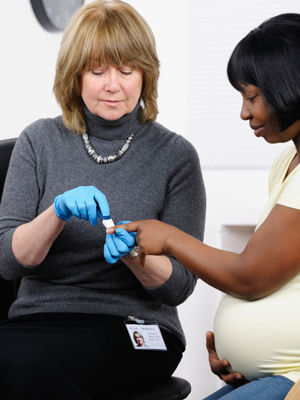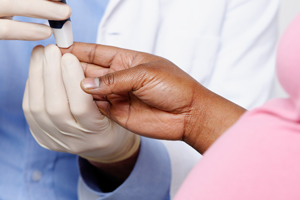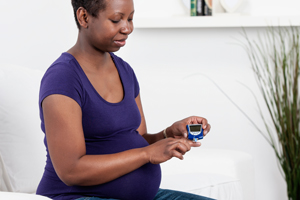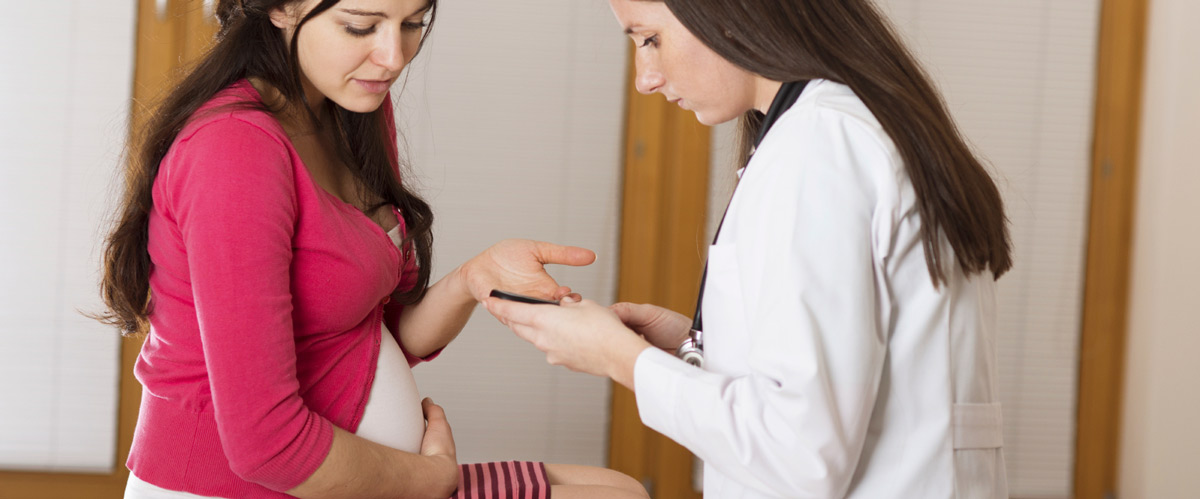 Gestational diabetes is a condition that affects certain women during pregnancy. It’s primarily the result of a lack of insulin produced during gestation, which affects the blood sugar levels making them higher than normal. Our bodies normally produce insulin to manage our blood sugar levels, however, during pregnancy, the amount of insulin required is significantly higher. If a woman doesn’t produce enough, their blood sugar levels (or glucose levels) will go up causing diabetes for the duration of the pregnancy only.
Gestational diabetes is a condition that affects certain women during pregnancy. It’s primarily the result of a lack of insulin produced during gestation, which affects the blood sugar levels making them higher than normal. Our bodies normally produce insulin to manage our blood sugar levels, however, during pregnancy, the amount of insulin required is significantly higher. If a woman doesn’t produce enough, their blood sugar levels (or glucose levels) will go up causing diabetes for the duration of the pregnancy only.
The good news is that if you do have this condition—and only about 8% do—it is not only manageable during your pregnancy, but it also goes away for most women immediately after the delivery of your baby. Statistically however, women who have had gestational diabetes are at risk of developing Type two diabetes later, so this is something to watch out for. Maintaining a healthy diet and a balanced lifestyle that includes regular exercise can help avoid that.
Gestational Diabetes and Diet
 Though women have higher blood sugar levels than normal when suffering from gestational diabetes, their condition can be greatly assisted with a healthy diet. The goal when managing gestational diabetes is to make sure you don’t consume too many carbohydrates, because carbohydrates turn into glucose in our bodies. If you can control the intake of carbohydrates, you will be able to keep healthy glucose levels thereby not allowing the gestational diabetes to affect your baby’s or your health negatively.
Though women have higher blood sugar levels than normal when suffering from gestational diabetes, their condition can be greatly assisted with a healthy diet. The goal when managing gestational diabetes is to make sure you don’t consume too many carbohydrates, because carbohydrates turn into glucose in our bodies. If you can control the intake of carbohydrates, you will be able to keep healthy glucose levels thereby not allowing the gestational diabetes to affect your baby’s or your health negatively.
The first thing to do when you are diagnosed with gestational diabetes is to make an appointment with a registered nutritionist who can assist you in finding foods that are healthy to consume and let you know how much of each will contribute to a balanced diet. Contrary to popular beliefs, you most probably don’t need to ‘cut sugar entirely’ or make drastic changes to your diet. You will primarily be tasked with making sure your glucose levels are at a healthy level. Foods that can contribute to healthy glucose levels during pregnancy are:
- wholegrain cereals
- lean chicken
- lean ham
- limited amounts of whole grain pasta
- fresh vegetables and salads
Foods to avoid or consume less of, if you have gestational diabetes (or for most healthy eaters in general) are those that will increase your glucose levels to unhealthy levels. These can include:
- sweets and desserts
- french fries and chips
- soda (diet or otherwise)
Gestational Diabetes Meal Plan
A nutritionist should ultimately create a personalized meal plan for anyone suffering from gestational diabetes. The goal is to control the amount of carbohydrates consumed, so that glucose levels will be kept at appropriate levels. Meal plans are similar however, and if you end up eating for two with gestational diabetes, your diet may look something like the following:
Breakfast
- one slice of whole wheat or whole grain toast
- one egg
- one glass of milk
- one teaspoon of butter or margarine
Mid morning snack
- one slice of whole wheat or whole grain toast
- one ounce of lean chicken or low fat cheese
Lunch
- one cup of salt free cooked brown rice
- two ounces of lean meat or chicken
- one cup of fresh vegetables
- one piece of fruit
- one cup of milk
- one tablespoon of low fat dressing or home-made combination of oil and vinegar
Mid afternoon snack
- one small orange or one slice of whole wheat toast
- one ounce of cheese or lean meat
Dinner
- one cup of brown rice or a potato or a cup of quinoa
- three ounces of lean meat
- two cups of a leafy salad
- one small piece of fruit (a cup of berries is a great idea!)
Evening Snack
- a piece of whole wheat toast with a teaspoon of organic sugar free and sodium free peanut butter
Gestational Diabetes Symptoms
During pregnancy your doctor will automatically test you for diabetes in your second trimester. However, if you are wondering if you are at risk for gestational diabetes, some of the common symptoms include:
- Feeling excessively tired
- Blurred vision
- Numbness in your arms and legs
- Feeling thirsty a lot more than usual
- Frequent urination
- having sores that don’t heal in a normal time frame
Some of these symptoms like feeling tired and frequent urination are common for all pregnant women, so it may not necessarily mean that you have gestational diabetes. It’s best to ask your doctor if you feel that you may have gestational diabetes. They can run the appropriate tests and let you know if you have the condition or not.
Gestational Diabetes Treatment
 Generally speaking, the treatment for gestational diabetes consists of a healthy meal plan catered for the patient by a nutritionist and healthy levels of physical activity approved by their doctor.
Generally speaking, the treatment for gestational diabetes consists of a healthy meal plan catered for the patient by a nutritionist and healthy levels of physical activity approved by their doctor.
Treatment also includes regular tests and can also include insulin shots. The latter two are at the discretion of your doctor. It’s best to check with them and discuss the options for treatment that best suit you and your baby.
Gestational Diabetes Causes
Generally speaking, a woman’s pancreas creates insulin. That insulin is what turns the glucose in our bodies into energy used to function on a daily basis. The main cause of gestational diabetes is a lack of naturally produced insulin that leads to excessively high glucose levels.
Other than that it is unclear what causes the shift in a pregnant woman’s body to produce less insulin. Some say that it is due to the hormonal changes a woman experiences during pregnancy. Either way the good news is that in most cases gestational diabetes ends upon delivery of the baby. And during the pregnancy, the condition is very much manageable with diet and exercise.
Gestational Diabetes Risk Factors
 Though it is unknown what the exact causes are for the lack of production of insulin during pregnancy, there are some factors that put women at a higher risk of contracting the condition. These include but are not limited to:
Though it is unknown what the exact causes are for the lack of production of insulin during pregnancy, there are some factors that put women at a higher risk of contracting the condition. These include but are not limited to:
- Age: women over the age of 25 are at higher risk of contracting gestational diabetes.
- Genetics: If diabetes runs in your family, you have a higher chance of developing the condition during your pregnancy.
- Weight: Significantly overweight women have a higher chance of developing gestational diabetes.
Gestational Diabetes and Autism
There are differing views on whether or not gestational diabetes is connected to children being born with autism. Some studies have suggested that in groups of women who were pregnant without gestational diabetes, the incidence of autism in their children were slightly lower than in those children born to women who did have gestational diabetes. Having said that, the difference is minor with the percentages of autism in gestational diabetes births being less than 1%. Even still, there have been some correlations found. So it’s best to check with your doctor to see if you have other risk factors that contribute to autistic related births and see what the possibilities are for you and your unborn child.
How Gestational Diabetes Affects Your Baby
The effect of gestational diabetes on your baby vary depending on the details of the symptoms of the mother. But some common symptoms for baby’s born to mothers who have gestational diabetes include:
- A preterm birth
- low blood sugar levels at birth
- jaundice
- respiratory challenges




